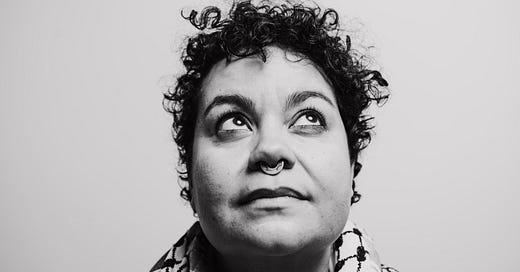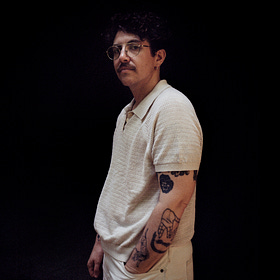If you are a queer person who knows other queer people or someone who’s invested in social justice and community activism, you have 100% lived through a nuclear breakup, cancellation, and/or been called upon to never speak to someone again. Loving Corrections, a new book by adrienne maree brown, is a collection of writings about conflict—specifically, how do you disagree with someone without othering them? How do you extend grace to yourself and others, and build relationships that can accommodate human error and messiness? This is a book for anyone searching for a better way to handle friction in their relationships, or interested in creating community and connection across difference.
After reading Loving Corrections, I sent adrienne maree brown some questions about breakups, what it means to be a student, and how to live in a violent, unjust world without losing hope—you know, chill topics for your Sunday morning. I’ve been following amb’s activism and writing for many years, so I’m really excited to share this queer author interview with you.
Maddy: I write an advice column about queer relationships and I receive a lot of questions from people who want to end a relationship, but are struggling to actually tell the other person. There’s frequently this stinginess and sense of like, “I’m not gonna expend more time and energy teaching my girlfriend what she should already know” or “I just want to move on already.” What would you say to someone on the verge of ghosting their partner or otherwise dipping from a relationship?
amb: I would love to do a whole course on good breakups. I am not always great at these, in romance or in friendship, but I have learned a lot about breaking up in ways that honor everyone’s humanity and dignity. My biggest tips for a grown folks’ breakup are:
Keep it short.
Stick to your own experience. One of the best pieces of break up advice I ever received is that you can’t control the other person’s internal/personal narrative. A lot of the pain in a break up is trying to force someone you aren’t compatible with to have the same opinion as you on why you don’t belong together. You don’t, so name the incompatibilities with as much clarity and kindness as you can and hear the response and then let go.
Don’t expect a miraculous change. Another great piece of advice I received is that whoever the person was in the relationship, that’s who they will be in the breakup. Ghosting is often the choice of someone who has been absent in some way all along. It can also be the choice of least effort for someone who has over exerted their heart in the connection and feels they have nothing left to give. But ghosting misses the crucial opportunity to actually end something with dignity. So much of the health of my current relationships is rooted in the wisdom harvest from honest breakups.
Actually break up! A lot of the stress of breakups occurs because you are trying to negotiate your next phase of relationship. In my experience, breaking up and taking space is necessary before you can really feel into what the next phase will be.
The one time I think ghosting is appropriate is if you are in an abusive relationship where you fear for your physical or emotional safety.
M: You’re on social media in a big way, but you’ve also written extensively about how miserable and divisive social media can be. Do you identify as someone who has a healthy relationship to social media and their phone and if so, what boundaries or practices do you have in place to maintain your peace-of-mind on the internet?
amb: I identify as someone who is trying to be responsible with social media and my phone, and some days are better than others. I have social media and screen time limits on my phone, and on my best days I honor those. It really helps to stay in touch with time if I have the screen time limits, so that I have to be intentional about adding another 15 minutes to my scroll time, instead of just losing hours there. I follow people who either inform or inspire me, and I restrict or block accounts which attack or bring divisive energy into my feed. I post things to uplift and inform followers, and particularly when I am posting about things that are devastating and hard, I orient towards posting action steps. I do like to be on my phone while watching tv and movies, (I get teased for this by friends and family) but I’ll often play games instead of scrolling.
M: There’s a moment in Loving Corrections when you write that people often confuse identity with being a part of a community. When I read this, I gasped aloud because so many queer people, including myself, do this thing where they express a lot of disappointment towards “the queer community” or a more specific subset of it, when what they really mean is that one or two individuals were jerks to them or they were annoyed by someone online. Do you have any advice for people who’ve arrived at an identity and are hoping to find *actual* community?
amb: I think this process of claiming our identities can be very healing. So many of the identities we carry were created by others, for the sake of categorizing and dehumanizing humans in the process of oppression. We can’t just dismiss these, because they are the lens through which most humans view the world, and they have very real implications on our quality of life, access and safety. But it is important that we look at our own lives, desires and needs to understand what identities feel true to us. Look for political home, look for people who share your values and your vision for the world you want to be part of creating. Look for people who enjoy the things you enjoy, who show up in ways that feel nourishing and connected. Look for people who are interested in all that you are, not just one identity marker.
M: You often describe yourself as a student of activists and writers like Octavia Butler, Grace Lee Boggs, and Audre Lorde. What does it mean to be a student and why do you think it’s important to cite your teachers?
amb: When I say I am a student of someone, what I usually mean is that I have engaged with their work - reading, listening, watching, participating - and let it change and shape me. To me it is important to show that I am shaped by people who came before me, who were shaped by people who came before them. We are never starting from scratch, we are being shaped by the society around us, and we are shaping the world to come. The ideas that are most compelling to me are not brand new, they are ancient ideas for how we can be responsible humans on a living earth. Each generation is taking these ideas - of love, freedom, justice, equality, right relationship - and figuring out how to grow and practice them in their modern context. I especially like to uplift when my teachers are people who share aspects of my identity which have been oppressed and silenced - Black women, queer people, indigenous thinkers, etc. Even when the world doesn’t want to hear us, we are shaping the future.
M: Okay last question: I basically live in state of political despair, but the past month has been especially brutal re: Gaza/Lebanon and extreme weather and flooding in the south. What do you do when you feel overwhelmed or powerless about the state of the world?
amb: I cry, I let myself feel the impact of my grief and anger. I remember that the vision I have of the future emerges from what is, so it is important for me to actually be in touch with the overwhelm, because it is truly an overwhelming time to be paying attention to the world. And then I seek action - how can I let these hard emotions fuel my next steps, and make me braver and clearer and more impactful in my solidarity?
Loving Corrections is out now from AK Press! Find a copy at your local bookstore or library. You can learn more about adrienne maree brown and her books, podcasts, and other projects here 💕
Heavyweight with Sol J Brager 💪
Hello! I’m back with another queer author interview, this time with Solomon J Brager about their new graphic novel, Heavyweight. My goal for this series is to highlight next-level fiction and nonfiction and resolve the “I want to read something but I don’t know what“ conundrum that I’m constantly hearing from friends and









Great questions and wonderful, thoughtful answers 💙
Wow what an interview!! This is wonderful💕